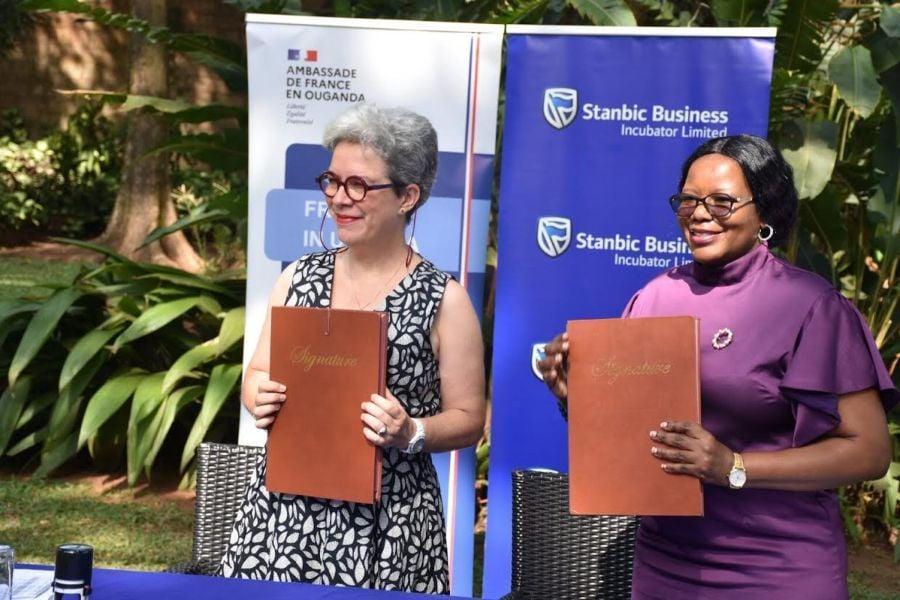Africa-Press – Uganda. The Stanbic Business Incubator Limited (SBIL) has signed a new grant agreement with the Embassy of France in Uganda to finance the Green Tech Incubator and Accelerator for Entrepreneurship Program.
The program, which targets the youth and women in the Kampala Metropolitan Area and the Albertine Region, aims to promote the development of a green, resilient, and highly innovative economy.
The French Ambassador, Mrs. Virginie Leroy, and Catherine Poran, the SBIL Chief Executive, signed the agreement at the Embassy in Kampala on Tuesday.
In her remarks, Ambassador Leroy said, “The project will support more than 200 Ugandan youth and women Small and Micro-Enterprises in sectors like sustainable cities, green mobility, circular economy, waste management, renewable energies, water and health, and smart agro/agri technologies, by strengthening their capacities, facilitating their access to finance and markets and creating an environment that fosters their growth.”
The Stanbic Green Tech Accelerator is a two-year initiative and is estimated to cost €687,833, including the French Embassy grant of €450,000 (about Shs1.8 billion), of which €131,351 will be released in the first installment. SBIL, on its part, is committed to co-financing the project to a tune of €237,833 (34.5%).
Poran said, “We are deeply grateful to the French Embassy for their vision and trust in supporting us and making this program a reality. Your investment is creating a transformative change in Uganda. Through this program, we anticipate to support north of 300 entrepreneurs to pilot and scale solutions, directly training over 1,000 entrepreneurs, ensuring at least 60% are women and youth.”
The Incubator was established in 2018 to help nurture and empower SMEs in Uganda to become resilient and sustainable businesses.
It is the enterprise development subsidiary of Stanbic Uganda Holdings Limited, which is part of the Standard Bank Group, the continent’s biggest lender by assets.
To date, SBIL has trained over 11,400 entrepreneurs and businesses in management strategy, specifically financial management and risk management. It has also supported them to formalize and access finance, as well as facilitated access to millions of dollars in funding and marketing opportunities.
The new program aligns with Uganda Vision 2040 and the government’s Green Growth Development Strategy.
Referring to Standard Bank Group and Stanbic’s presence in Uganda that dates back to 1906, Poran said, “This long-standing presence, being witness, and supporting and evolving alongside Uganda is why we confidently state that ‘Uganda is our home and we drive her growth’. We have shared in the nation’s triumphs and challenges, standing shoulder to shoulder with its people, enterprises and community. This heritage grounds everything that we do.”
“We’ve enabled entrepreneurs to participate in strategic sectors, agriculture, infrastructure, and each milestone represents jobs created, livelihoods transformed and communities strengthened. This is why we proudly say that we drive Uganda’s growth. With the Green Tech Incubator and Accelerator, we are extending this legacy into the green economy, enabling entrepreneurs to innovate, to solve climate challenges, but also create opportunities for growth for women, youth and farmers.”
“We would not be able to do this without the support of the French Embassy. Your Excellency, on behalf of the Stanbic Business Incubator, we want to appreciate you for the support that you have extended to the incubator to fulfill this pledge in supporting the entrepreneurs,” Poran said.
Aaron Akampa, Head of Enterprise Banking at Stanbic Bank, said, “Our commitment to the initiative is to be there to provide some of the pipeline of SMEs that will be participating in this initiative. But beyond that, I think sometimes beyond the training is access to liquidity.”
“Thanks to the Uganda Energy Credit Capitalisation Company, there is funding, but we as Stanbic Bank also have quite a big pool of liquidity on top of what they already have to provide to these SMEs with the funding that they need. Renewable energy and green finance is a very important priority right from the Standard Bank Group. It’s one of the top three most important things that the Group will be driving over the next five years.”
The acceleration phase (3–6 months) will see 130 SMEs in the green economy develop coherent business plans, marketing strategies, and HR recruitment plans.
Additionally, 130 homesteads (50% women, 30% young people) will acquire the knowledge and contacts necessary to develop their order books through partnerships and strategic alliances.
The incubation phase (6–18 months) will support 70 selected entrepreneurs (50% women, 30% young people) in the green economy to develop their projects in the green technology (green tech) sector. These businesses will benefit from product improvement through technical support from innovation hubs, and the development of coherent business plans and marketing and communication strategies.
In terms of facilitating access to financing, at least 60 Ugandan SMEs in the green economy will access funding in the form of loans, grants, or investments to develop their businesses. A €300,000 blended finance facility has been set up for this purpose.
The project reaffirms France’s long-term commitment to supporting innovation, entrepreneurship, and employability of Ugandans, particularly women and young people.
This is evidenced by the Embassy’s recent support to women and young people in the agroecology and ecotourism sectors (2021 and 2023), 110 micro, small and medium-sized enterprises via Stanbic Business Incubator Limited, 500 women and young people in the hospitality and agroecology sectors through training, networking and support for young entrepreneurs under the Youth Employability Project (2023–2025), and six startups in the cultural and creative industries (animated films, video games, music, virtual reality, and others) under the SPICE Project (2024–2025).
For More News And Analysis About Uganda Follow Africa-Press






